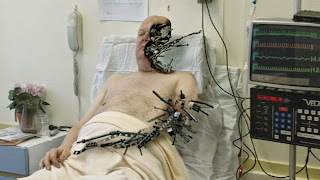March 31, 2015
Tiny 'Nanoneedles' Could Help Your Damaged Organs Repair Themselves
The Real-Life Science Behind Orphan Black
March 30, 2015
Do You Suffer From 'Exploding Head Syndrome'? You're Not Alone.
March 27, 2015
A.I. Pilots Are Not The Solution To Preventing Airline Disasters
This Biohacker Used Eyedrops To Give Himself Temporary Night Vision
March 26, 2015
This New Infrared Telescope Could Help Us Detect Dyson Spheres
March 25, 2015
The 9 Weirdest Implications Of The Many Worlds Interpretation
We Should Be Able To Detect Spaceships Moving Near The Speed Of Light
Read more at io9.
Why A Moratorium On Heritable Genetic Modification Is A Bad Idea
March 12, 2015
New "Senolytic" Drugs Can Dramatically Increase Healthy Lifespan
March 6, 2015
These Are The Surprising Jobs You'll Be Doing By The 2030s
As our technological and sociological realities change, so too do our jobs. But just what, exactly, will we be doing 15 years from now? Here are some completely unexpected jobs you've almost certainly never heard of—but likely will soon.
Indeed, the landscape of careers is changing. But knowing which vocations are around the corner is not obvious. This is why the Canadian Scholarship Trust, as part of its Inspired Minds campaign, recently collaborated with the foresight experts at Idea Couture (a team that included scifi author Karl Schroeder). Together, they came up with 10 jobs that are likely to appear within the next 15 years or so, along with the skills and education required.
The end result is Careers 2030—an intriguing piece of speculative work designed to inspire conversations—between parents and kids, teachers and students, and so on—about what the world of work might look like in the near future. To learn more, we contacted Jayar LaFontaine, a Foresight Strategist at Idea Couture.
Read the entire article at io9.
The 10 Algorithms That Dominate Our World
12 Futuristic Forms of Government That Could One Day Rule the World
9 Unexpected Outcomes Of Human Cloning
How Artificial Superintelligence Will Give Birth To Itself
The Radical Plan To Phase Out Earth's Predatory Species
Why Do the Anarcho-Primitivists Want to Abolish Civilization?
10 Horrifying Technologies That Should Never Be Allowed To Exist
Are We Overthinking the Dangers of Artificial Intelligence?
12 Technologies We Need To Stop Stalling On And Develop Now
Want to Stay Healthy? You'll Need to Become a Human-Animal Hybrid.
Could Game Theory Be Used To Prevent Human Extinction?
The Top 100 Science Fiction-Themed Songs Of All Time
How Universal Basic Income Will Save Us From the Robot Uprising
Is It Time to Accept That We're Alone in the Universe?
How The Search For Aliens Could Save Us From Environmental Collapse
10 Diseases That Might Afflict Us In The Future
The Coming Age Of Cyborg Animals
March 5, 2015
12 Reasons Robots Will Always Have An Advantage Over Humans
We puny humans can be depressingly fragile and flawed, a realization that's all the more discouraging when we consider the incredible potential for robots. Here are 12 reasons why machines will always have the edge over us meatbags.
Read the entire article at io9.
How The Military Could Turn Your Mind Into The Next Battlefield
How Humanity Will Conquer Space Without Rockets
Getting out of Earth's gravity well is hard. Conventional rockets are expensive, wasteful, and as we're frequently reminded, very dangerous. Thankfully, there are alternative ways of getting ourselves and all our stuff off this rock. Here's how we'll get from Earth to space in the future.
Read the entire article at io9.
8 Logical Fallacies That Fuel Anti-Science Sentiments
How To Create A Virtual "Body" For Your Uploaded Mind
The prospect of uploading your brain into a supercomputer is an exciting one — your mind can live on forever, and expand its capacity in ways that are hard to imagine. But it leaves out one crucial detail: Your mind still needs a body to function properly, even in a virtual world. Here's what we'll have to do to emulate a body in cyberspace.
Read the entire article at io9.







































